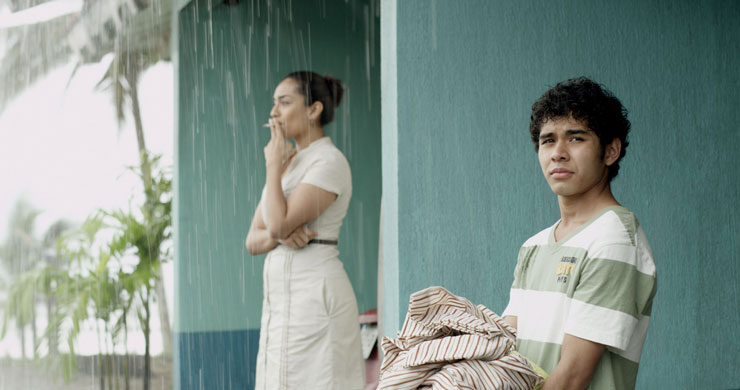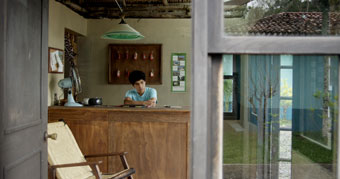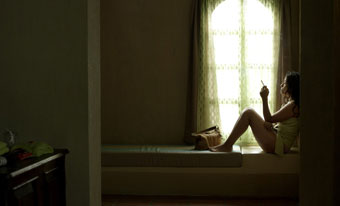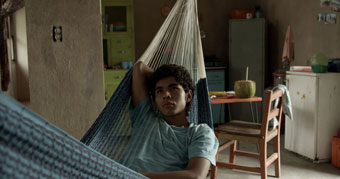
Left to Right: Adriana Paz, Kristyan Ferrer
The wind blows heavily in the desolate region of Veracruz where The Empty Hours, a new Mexican film that opened July 25 at the Tower Theater, takes place. Think of Daytona Beach in the off season, and you’ll have an idea of how slowly life is lived in the area that surrounds the out-of-the-way Motel Palma Real, where our young protagonist finds himself in charge.

Kristyan Ferrer
That would be Sebastián Ramírez Novoa (Kristyan Ferrer), slim, mop-topped and, yes, very green when it comes to hospitality management. As it turns out, his uncle Gerardo (Fermín Martínez), who owns the motel, has to go to town to undergo a series of medical tests, and he has entrusted his lovers’ den to his favorite nephew from Jalapa, even though the kid’s only 17. “Eighteen in three months,” he points out. Picky, picky.
Before he takes off, Uncle Gerry gives Sebastián a tour of the facility, which has seen better days but is nevertheless well maintained enough to attain a certain unassuming charm. This is writer-director Aarón Fernández’s opportunity to give viewers the lay of the land: 10 rooms, complete with carport and large beige curtains that conceal even the customers’ vehicles. "Pay attention," he seems to be telling viewers. You’re going to become awfully familiar with every corner of this by-the-hour establishment.
It’s a neat feat Fernández pulls off here: He conveys the unhurried rhythms that permeate Sebastián’s tenure as motel manager within the confines of a tautly constructed narrative. His mise en scene seems to capture life as it unfolds in mundane fashion, and yet taking a step back to examine the feature as a whole, it’s evident the filmmaker – ably assisted by cinematographer Javier Morón’s widescreen vistas – has carefully conceived the movie’s structure, pacing and visual design. For all its longueurs, it feels a lot tighter in retrospect than while you’re seeing it.

Left to Right: Eliseo Lara Martinez, Adriana Paz
Early on, it also becomes clear The Empty Hours doesn’t just aim to tell Sebastián’s story. Interweaved with the goings-on at Motel Palma Real, we look in on Miranda (Adriana Paz), an itinerant real estate vendor currently on assignment at a nearby complex of single-story condominiums. It’s clear the businesswoman in her early 30’s is a go-getter, but she’s also fighting an uphill battle trying to sell these units in a country confronting a stagnant economy. At least she’s got those steamy trysts with Mario (Eliseo Lara Martínez) to look forward do. Ah, handsome, emotionally unavailable Mario. Always making her wait … and always worth the time commitment behind closed doors.

Adriana Paz
And so Miranda starts noticing the wet-behind-the-ears whippersnapper running things at the motel. It begins, like much in Fernández’s film, ordinarily enough. The newly hired maid has neglected to show up, and the room where Miranda and Mario were, um, frolicking, happens to be out of towels. Sebastián hands Miranda the towels, and that’s that. But Fernández takes a shine to the way these two gradually, spontaneously begin to know each other. Seba drives a small motorbike. Miranda putts away in a beat-up red VW Beetle. Seba just throws on a T-shirt and shorts. Miranda’s well aware personal appearance is everything, both in business and pleasure, so we see parading in a series of cheery skirts and, later in the film, a smoking cocktail dress.
And yet the mismatched duo shares that elusive, melancholy quality that draws two perfect strangers together: loneliness. “My thing isn’t all that serious,” Miranda confides to Sebastián about her current fling, even as her voice betrays a longing for more intimacy. In The Empty Hours, being lonesome is not just a state of mind. It’s in the very air the characters breathe. It’s almost as if Fernández is letting the motel rooms do the storytelling. In his expansive landscapes, the walls can and do talk, placing viewers on the cold mattress next to lovers engaging in post-coital small talk, mere minutes after they were swept up in the throes of passion. This movie speaks the language of afternoon delights.

Kristyan Ferrer
In almost every shot, the actors are framed in connection with their background. The camera’s a silent, clear-eyed voyeur, a fly on the wall taking it every furtive glance, every clandestine rendezvous, even those taking place just out of sight. If the storyline sounds remotely familiar, yes, there are echoes of Y tu mamá también in Fernández’s film, though his modus operandi is, from a formal standpoint, a lot more straightforward that Alfonso Cuarón’s.
There are no transformative events in The Empty Hours, no lifelong bonds. This is a film about transitory people, thrown together by happenstance, solitude and those strong Veracruz breezes. It stays with you in ways you’d hardly expect from a deceptively simple tale of a boy coming face-to-face with career-driven independence – and all the responsibilities that come with it.
Coupled with the Miami International Film Festival showings of Club Sandwich and Heli (as well as Heli’s local theatrical run) this trifecta of gems from south of the border seem to herald the arrival of a Mexican New Wave in South Florida. Here’s hoping the trend continues.
 MAIN MENU
MAIN MENU

